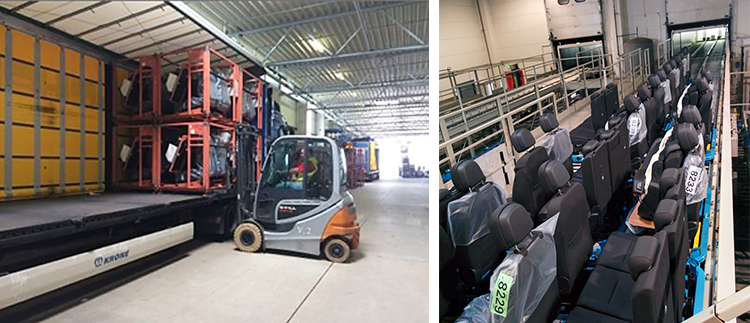
Lear and 4flow successfully implement machine learning
A good exception management system is key to achieving one of the most important objectives in supply chain management: stable transportation processes. Disruptions, also known as exceptions, interrupt planned supply chain processes and lead to increased effort and costs and reduce quality. In a worst-case scenario, they can result in delivery bottlenecks or production stoppages. Time is critical here, so when exceptions occur there needs to be an immediate response.
In the near future, however, an immediate reaction will not be enough to stay ahead of the competition. Today’s digital leaders are already gaining considerable ground with machine learning. They can detect imminent disruptions days in advance and prepare for them, or proactively prevent them using the appropriate measures. One digital leader working successfully with machine learning is the automotive supplier, Lear – whose system was implemented in cooperation with 4flow.
Lear’s highly complex production network
The Lear Corporation, headquartered in Southfield, Michigan, is one of the world’s leading manufacturers of automotive seating and electrical distribution systems with 161,000 employees at 261 locations in 39 countries. The company faces the daily challenge of planning, managing and operating supply chain processes for an increasingly diverse and dynamic production network. With over 70 plants supplying one another with parts in Europe and Africa alone, this is no simple task.
4flow develops exception prediction system for Lear
In 2012, 4flow worked with Lear to standardize and optimize its processes. Since then, 4flow, as a fourth-party logistics service provider (4PL), has optimized, operated and managed Lear’s transportation network in Europe and Africa. Additionally, 4flow implemented an exception prediction system for the manufacturer, enabling the forecasting of some exceptions in Lear’s transportation processes. 4flow applied different machine learning models to analyze the exceptions present in Lear's transportation network and then determined which of them could be predicted.
Pilot yields promising results
Based on a large variety of data, qualitative factors such as loading time frames and quantitative factors such as analytical correlations were identified starting in late 2017. A subsequent analysis was carried out to determine which of the factors would be applied in the machine learning system. The system was then tried and tested using extensive historical data. Based on the results, the system continued to be developed iteratively until reaching a level of quality that enabled its pilot to process actual data. This system has been in operation at five Lear plants since the end of 2018. "4flow’s idea to identify obvious exceptions using artificial intelligence impressed us immediately," said Dennis Henning, Vice President of Operations & Logistics at Lear. "And the very promising results of the pilot phase even exceeded our expectations."
Machine learning delivers better results than reporting
With machine learning, the algorithm learns – as with humans – through experience. The system is however much faster and can recognize many more complex relationships. A supply chain planner typically considers a handful of factors that might be responsible for the occurrence of a disruption. Lear's exception prediction system considers over 30 factors alone for detecting deviations in volume in supplier shipment details. The algorithm’s scope is much larger, which increases the likelihood that predictions are right.
To provide an example, if a given supplier causes an exception every week for three consecutive weeks, a human might expect the exception to occur again in the fourth week. An algorithm on the other hand recognizes that the factors leading to disruption throughout the previous weeks were not in fact influenced by the supplier. If based on this finding the algorithm predicts that an exception will not occur for the same supplier the following week, it is most likely correct.
"In contrast to algorithms, we humans often come up with pseudo-correlations," explained Niklas Bergner of 4flow, responsible for developing process-based machine learning models. "For example, we thought exceptions would increase following a public holiday, before regular routines resume. To our surprise, however, we discovered that this did not play a significant role." Even experienced transportation managers hardly manage to identify and consider all of the relevant factors. "The results delivered by our machine learning model are significantly better than those of normal reporting," said Niklas Bergner.
Greater precision with increasing amounts of data
For machine learning to work, it is essential to feed the system with data – the more, the better. Increasing amounts of data and data quality lead to more accurate predictions, with the calculations based on probability. The system learns. Not only do the algorithms find the right correlations, but they are adjusted automatically when new patterns are recognized or when conditions change. An algorithm, however, is only successful once it has been integrated to an efficient process capable of avoiding a recognized disruption.
Following this idea, 4flow implemented a process at Lear where all registered transport orders for the upcoming week are checked by the system. If the algorithm identifies the risk for an exception, an email is automatically sent to the relevant stakeholders in order to initiate the appropriate countermeasures. For example, suppliers are asked to review their shipment details.
Precision of more than 50 percent in pilot phase ensures more stable transportation processes
Already in the pilot phase, Lear's exception prediction system worked with a precision of 51 percent – meaning that over half the exceptions identified, actually occurred. The absolute exception rate was reduced by 11 percent within the first 10 to 12 weeks at the five pilot plants. This significant improvement in operational network performance saves costs and provides more robust transportation processes, which also benefit Lear’s suppliers and carriers. Lear and 4flow are currently planning a rollout at additional plants.
Authors: ANDREAS KICK, Partner at 4flow and FELIX KAEMMERER, Vice President at 4flow
Subscribe to the 4flow newsletter
Receive our newsletter four times a year to stay up-to-date on new projects, supply chain topics and news from 4flow.
Subscribe
